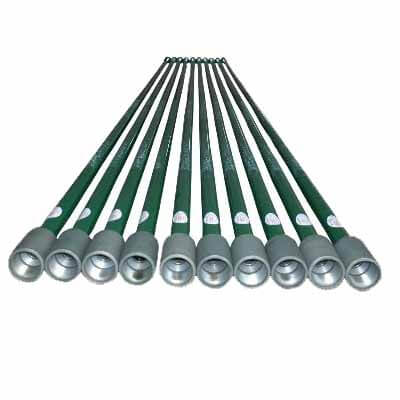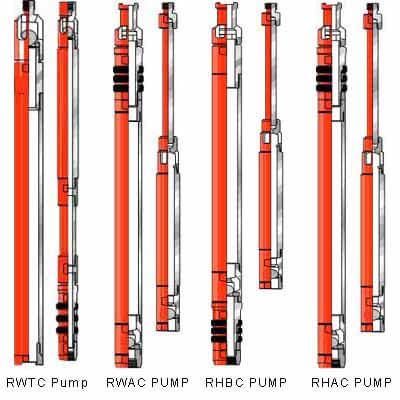Sucker Rod Pumps and Fittings
Types Of Rod Pumps
1.Installed on the end of a sucker rod string as a complete unit.
2.Can be randeeper than Tubing Pump.
3.Special service application are available for most types.
4.Less service cost than a tubing pump.

■ Product's advantage
Features Of Rod Pumps
>>Installed on the end of a sucker rod string as a complete unit.
>>Can be randeeper than Tubing Pump.
>>Special service application are available for most types.
>>Less service cost than a tubing pump.
Types of Rod Pumps
>>Bottom Hold Down:
RWTC
RWBC
RHBC
>>Above Hold Down:
RWAC
RHAC
>>Mechanical Type Holddowns also available in same configuration.
>>All pumps shown with Cup Type Holddowns.

RWTC-API Rod Pump
>>Barrel Travel with Rod String.
>>Bottom Holddown.
>>Thin Wall Varrel.
Advantages of RWTC Pumps:
>>Recommended for sandy wells.
>>More rugged than a stationary barrel with respect to the sucker rod connection: Pull Tube vs Valve Rod
>>Recommended for intermittent pumping wells.
Disadvantages of RWTC Pumps:
>>Not recommended for gassy wells.
>>Not recommended for wells with low fluid levels.
>>Not recommended for deep wells.
RWAC-API Rod Pump
>>Plunger Travels with Rod String.
>>Top Holddown.
>>Thin Wall Barrel.
>>Barrel Extends Below Seating Nipple.
Advantages of RWAC Pumps:
>>Recommended for sandy wells.
>>Recommended for low fluid levels, gassy, or foamy wells.
>>Recommended for wells requiring long pumps.
Disadvantages of RWAC Pumps:
>>Not recommended for deep wells.
>>Valve rod is the weak link.
>>Not recommended for intermittent pumping.
>>Tubing erosion opposite top guide.
RHBC-API Rod Pump
>>Plunger Travels with Rod String.
>>Bottom Holddown.
>>Heavy Wall Barrel.
Advantages of RHBC Pumps:
>>Recommended for deep wells.
>>Recommended for low fluid levels.
>>Recommended for stroke through design to combat scale and/or gyp.
Disadvantages of RHBC Pumps:
>>Not recommended for sandy wells.
>>Valve rod is the weak link.
>>Not recommended for intermittent pumping in sandy wells.
>>Barrel subject to corrosive attack.
RHAC-API Rod Pump
>>Plunger Travels with Rod String.
>>Top Holddown.
>>Heavy Wall Barrel.
>>Barrel Extends Below Seating Nipple.
Advantages of RHAC Pumps:
>>Recommended for sandy wells.
>>Recommended for low fluid levels, gassy, or foamy wells.
>>Recommended for stroke through design to combat scale and/or gyp.
>>Recommended for wells requiring long pumps.
Disadvantages of RHAC Pumps:
>>Not recommended for deep wells.
>>Valve rod is the weak link.
>>Not recommended for intermittent pumping.
>>Tubing erosion opposite top guide.
There are some other products you may be intersted in , please click to know about the details.
Rod Pumps Tubing Pumps V11 Valve Ball and Seat Subsurface Sucker Rod Pumps Cages of Sucker Rod Pumps Barrels of Sucker Rod Pumps Parts of Sucker Rod Pumps Types Of Rod Pumps Types of Tubing Pumps Plungers of Sucker Rod PumpsINQUIRY
Send your message to us. We'll respond as soom as possible.




